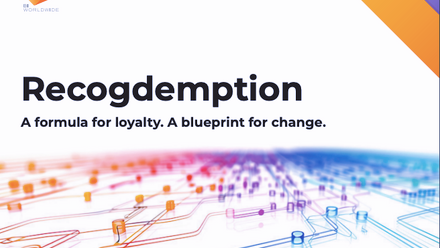Why values-based recognition leads to improved staff retention

In its simplest form, values-based recognition is all about linking every appreciation moment back to the company’s values, reinforcing what the company stands for and the ‘right’ behaviours in keeping with these values. After all, when certain behaviours are applauded, publicly recognised and rewarded, they are more likely to be repeated, again and again.
So, let’s say a company’s values are innovation and customer service excellence. This must then be translated into behaviours the company would like to see its employees displaying, such as a willingness to try new things and ‘going above and beyond’ in the pursuit of great customer service. When employees then demonstrate these behaviours, even if great results don’t follow, they must be called-out and rewarded, linking their behaviour back to the appropriate organisational value.
Here are some tips on making a values-based recognition strategy work for your company:
Clearly articulate values and the ‘right’ behaviours
Companies need to know which values and behaviours it wants to encourage. Focus groups are a good way to determine these but it’s vital to keep it simple and leave out the jargon. Once agreed, they must then be clearly articulated to colleagues, from the front line through to the CEO, perhaps using a ‘behaviour guide’, to clearly explain which behaviours the company wants to see and doesn’t want to see.
Embed the company’s values into everything
Every value must be ‘lived and breathed’ every single day with no exceptions, from who is recruited and how, through to R&D and after-sales. If the company’s values are just seen as artwork on the Chairman’s wall, there will be widespread disaffection and any attempt at a values-based recognition programme will fail.
Reward effort as well as results
Traditionally, companies have performance managed people based on hard results and not their behaviour. For recognition success, it is important to both recognise effort and reward results in equal measure, always linking back to values. It is just as important to cheer those making the passes as it is those taking the final shot to score the goal.
Don’t turn a ‘blind eye’ to brilliant jerks
It’s all too easy for companies to turn a ‘blind eye’ to employees who achieve the results but at the expense of the ‘right’ behaviours. Letting employees ‘get away’ with unacceptable behaviours because they are hitting their targets will undermine the whole values system, creating cynicism and disillusionment.
Values should always be at the heart of recognition, driving forward the behaviours the company wants to see repeated over and over again. It’s only when values are truly embedded into appreciation and reward, do organisations fully reap the benefits of a recognition programme.
The author is Robert Ordever, Managing Director of O.C. Tanner Europe.
This article is provided by O.C. Tanner.
* O.C. Tanner’s 2018 Global Culture Report
Supplied by REBA Associate Member, O. C. Tanner
Giving teams the integrated tools they need when, where and how they need them.







